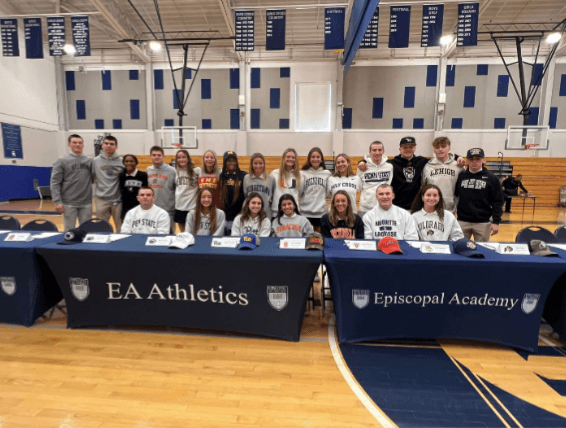Sophia Venneri ’26
Embarking on the journey of being a student-athlete at EA is a commendable achievement, regardless of whether one chooses to pursue sports at the collegiate level. The college recruiting process, often perceived as an intimidating odyssey, should be approached with excitement and knowledge, according to the insights shared by student-athletes who have navigated this path.
For Caroline Powell ’25, the process was “pretty fast and quick,” but it can be elongated for others. Bella Notaro ’24 explains, “It was stressful, but it became a really good experience because I learned so much about so many different places, schools, and myself.”

Photo courtesy of Courtney Brinkerhoff-Rau
The college recruiting process varies for each athlete, and understanding its nuances is crucial. Colleges are restricted from communicating with athletes until specific dates, either June 15th (going into junior year) or September 1st of junior year, depending on the sport. Hunter Stetson ‘24 emphasizes, “Get started as early as possible by sending emails and updating them on your performance and progress. I also learned that you should contact coaches you do not think you have a chance with because I eventually found out I did… Also, try and let them know about who you are as a person because at first they want good athletes, but ultimately, it will come down to being a good person,” Powell adds, “Make sure you show them your true personality,”
An essential part of gaining exposure to colleges is getting help from high school coaches, club coaches, parents, and teammates. Hanna-Mae Legaspi ’25 explains, “Put a lot of trust into your coaches because they’ve sent other kids through the same process.” Stetson comments, “My golf coaches at school, Dr. Borgerson, Coach Fitzpatrick, and especially Mr. Elliott, helped me throughout the process by giving me guidelines and helping me develop as a player while getting in touch with coaches. Without them, I would not have been able to make it to such a great school.” Powell also remarked that Head Field Hockey Coach Paul Zelenak was “so helpful with emailing coaches, which was super nice.” The process can be overwhelming, so utilizing and appreciating the resources and support surrounding you throughout your journey is vital. Macfarland explains how it is okay to ask for help: “If you need help, don’t be afraid to ask questions, talk to the older guys, and try to absorb as much information as possible.”
It is easier said than done, but be confident in yourself and what you have achieved. “Don’t be shy when you get the chance to show off your ability at clinics or camps,” remarks Powell. Zeke Kane ’24 says, “Playing free and going out there and just doing your thing is much better than feeling like you have a hundred eyes on you.” Don’t let the pressure get to you. Stetson says, “In regards to developing your skill, I would put in as many hours as you can with efficient work, and if this is really what you want to do, you need to put your all into it: early mornings and late nights.” Channel your years of hard work into these camps, clinics, and opportunities for exposure. Show the colleges the talent and skill that you have.
During sophomore year, it is a good idea to start making a list of schools you are interested in. Once you get closer to the summer and the beginning of junior year, narrowing down that list will be effective in helping you make your decision. Make sure to research and visit the colleges you are most interested in to help give you a sense of where you can see yourself. When the time rolls around when coaches can reach back out to you, things start to get hectic. It seems as though it is over before it even begins due to the fast-paced and exciting nature of the process. It is important to remember to “stick to your process,” comments Notaro. “You need to soak it in because it is a month of stress. But after that, you are just waiting to go to college,” remarks MacFarland. Junior year is generally the time of commitment and finalization of the recruitment process for most sports, so utilize your senior year to prepare for collegiate-level play.

Photo courtesy of Courtney Brinkerhoff-Rau
If you are unsure of whether or not you want to pursue your sport in college, think about “if it’s something that you can see yourself doing when you’re an adult,” says Notaro. Make sure you genuinely love and have a strong passion for the sport you are considering pursuing. “There is no loss if you don’t go for it. Sports really benefit you even if you don’t succeed because you still learn from your disappointments,” states MacFarland. The bottom line is you need to assess your passion and love for your sport. Stetson remarks, “If you truly have the passion to do it, I would chase it.” From there, don’t be afraid to put yourself out there. Remind yourself that everything happens for a reason. Remember that your high school and club coaches are valuable assets you should utilize. There is also, “so much joy you can find in just playing your sport up until being a senior in high school, and then being able to close that chapter and move on as an adult,” states Notaro. Ultimately, the decision is up to you, but don’t shy away from the idea just because you are scared of the process.